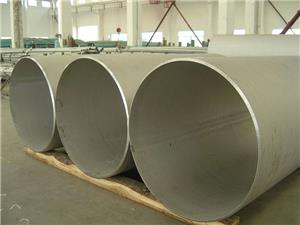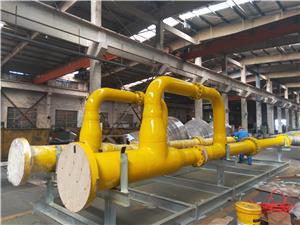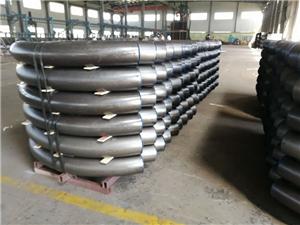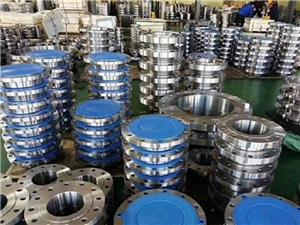Detailed explanation of special material pipeline prefabrication
In addition to the common prefabricated pipes made of traditional metal materials such as carbon steel, stainless steel and alloy steel, special material pipeline prefabrication also occupy an important position. These special materials generally include titanium alloys, nickel alloys, zirconium alloys and chromium-molybdenum alloys. They have unique physical and chemical properties and are suitable for extreme environments and special purposes.
1. Titanium alloy pipe
Titanium alloys are widely used in the aerospace, marine engineering and chemical industries due to their excellent corrosion resistance and high strength-to-weight ratio.
Application:
Aerospace: Hydraulic systems, fuel lines for aircraft and spacecraft. The light weight and high strength of titanium alloy make it an ideal material for aviation equipment.
Marine engineering: such as desalination equipment, submarine pipelines and offshore platforms. Titanium alloy shows extremely high corrosion resistance in seawater environment and is the material of choice for marine engineering.
Chemical industry: pipelines used to transport highly corrosive media, such as sulfuric acid, hydrochloric acid, etc. Titanium alloys have excellent re sistance to a variety of chemical media.
Advantage:
Corrosion resistance: It has extremely high tolerance to seawater, acid, alkali and other media, and can be used in corrosive environments for a long time.
High strength-to-weight ratio: While maintaining high strength, it is lightweight, which helps reduce structural load.
High temperature resistance: maintains good mechanical properties in high temperature environments and is not easily deformed.
Biocompatibility: Non-toxic and harmless to living organisms, suitable for medical field.
Shortcoming:
High cost: Production and processing costs are high, which limits its large-scale application.
Difficulty in processing: high requirements on processing equipment and technology, complex welding and forming processes.
2. Nickel alloy pipes
Nickel alloys are widely used in the chemical industry, energy and aviation fields due to their stability in high temperatures, high pressures and highly corrosive environments.
Application:
Chemical industry: such as acid and alkali production equipment and pipelines, especially in corrosive environments under high temperature and pressure. Nickel alloy pipes can effectively resist corrosion from chemical media.
Energy: such as nuclear reactor cooling systems, gas turbines and heat exchangers. Nickel alloys are widely used in the energy industry for their high temperature properties and oxidation resistance.
Aviation: used in key components of aircraft engines. The high strength and high temperature resistance of nickel alloys make them ideal materials for aerospace engines.
Advantage:
High temperature resistance: maintains strength and stability in extremely high temperature environments and is not prone to creep.
Corrosion resistance: Excellent resistance to a variety of corrosive media, such as chlorine, sulfuric acid, phosphoric acid, etc.
Anti-oxidation: Excellent antioxidant ability in high-temperature oxidizing environments.
High strength: It can still maintain high strength under high temperature and high pressure conditions.
Shortcoming:
Expensive: Due to the scarcity and difficulty of processing nickel, the cost is high.
Complex processing: special processing technology and equipment are required, and work hardening and cracking are prone to occur.
3. Zirconium alloy pipe
Zirconium alloy has extremely high corrosion resistance and biocompatibility and is mainly used in the nuclear industry and medical fields.
Application:
Nuclear industry: such as cladding materials and piping systems for nuclear reactors due to their low absorption cross-section for neutrons. Zirconium alloy can effectively reduce the absorption of neutrons and improve fuel utilization in nuclear reactors.
Medical devices: such as surgical implants and dental instruments due to their excellent biocompatibility. Zirconium alloy is non-toxic and harmless to the human body and is suitable for various medical implants.
Advantage:
Corrosion resistance: Excellent performance in highly corrosive environments such as acids and alkalis.
Low neutron absorption cross-section: Reduce neutron absorption in nuclear reactors and improve fuel utilization.
Biocompatibility: non-toxic and harmless to the human body, suitable for medical implants.
High strength: It has good mechanical properties and can withstand greater pressure.
Shortcoming:
High cost: The extraction and processing costs of zirconium are high, which limits its application scope.
Processing difficulty: special processing technology and equipment are required, and it is prone to oxidation and brittleness.
4. Chromium-molybdenum alloy pipe
Chromium-molybdenum alloys (such as P91 and P92 steel) are widely used in the power and petrochemical industries due to their excellent high-temperature strength and corrosion resistance.
Application:
Electric power industry: such as high temperature and high pressure boilers and superheater pipes. Chromium-molybdenum alloy can work in high temperature and high pressure environments for a long time.
Petrochemical industry: such as high temperature and high pressure pipelines in refineries and chemical plants. Chromium-molybdenum alloy pipes can effectively resist corrosive media such as sulfide and hydrogen.
Advantage:
High temperature resistance: Good strength and stability in high temperature environments.
Corrosion resistance: It has good corrosion resistance against sulfide, hydrogen, etc.
High strength: It can still maintain high strength and toughness under high temperature and high pressure conditions.
Good weldability: suitable for various welding processes and has good welding performance.
Shortcoming:
Complex heat treatment: A strict heat treatment process is required to obtain optimal performance.
Higher cost: Because it contains a variety of alloying elements, the cost is higher.



